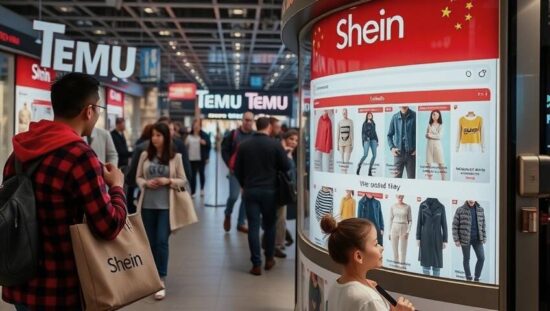German Industry and Trade Association (DIHK) demands tougher regulations from European authorities in the fight against cheap goods from Chinese sellers like Temu and Shein. “It is necessary to have an effective control of imports in terms of the legality of products, product safety, and appropriate consumer information” the DIHK’s presidential decision paper says, as reported by the Funke Media Group’s Sunday editions.
The paper lists ten measures that are necessary in the face of the impact of these platforms on the German economy. According to the chamber, over a billion small goods shipments enter the EU every year, with around 400,000 packages arriving in Germany daily, mostly from China.
The problem is that sellers like Temu and Shein do not always declare their goods properly. There is a “widespread underdeclaration” and, as a result, the import or sales tax is being evaded. “Estimates suggest that the tax authority is losing billions of euros in revenue” the DIHK’s paper says. Temu and Co. also disregard European product, social, environmental, and brand standards.
“These illegal practices are threatening local business models” the paper says further. The Chinese platform Temu, in particular, often puts goods on the market at rock-bottom prices. For example, there was a smartwatch for 7.28 euros or a smoothie mixer for 8.69 euros on the platform in the past.
The aggressive pricing policy has recently also caught the attention of politics. The EU, for instance, reacted with the Digital Services Act (DSA) last year, which contains stricter measures to combat illegal products and content.
DIHK’s foreign trade chief Volker Treier does not consider the measures taken so far to be sufficient. “Previous measures by the EU Commission, such as the Digital Services Act, have not yet achieved the expected success. The politics are required to act urgently” Treier said to the Funke Media Group’s newspapers. Although international trade is a highly important achievement, trade must also take place under fair conditions.
“The sometimes unfair competition is not only a problem for the German retail trade, but also for manufacturers. While German and European companies are subject to strict regulations and standards, some online marketplaces in other regions do not adhere to these standards. As a result, these companies avoid costs and can offer goods at extremely low prices” Treier explained further.
The chamber is now demanding, among other things, a stricter control of self-declared goods. The EU Commission is being called upon to “provide or build up the necessary resources and personnel to ensure that the legally binding obligations are consistently and practically fulfilled” the paper says.
In addition, the DIHK is calling for a reform of the World Trade Organization (WTO) rules. Although exports at prices below the production costs are prohibited, a reform of the rulebook is necessary “to address specific challenges of e-commerce platforms” according to the proposal in the paper.
Furthermore, the DIHK is also calling for “punitive measures for non-compliance with EU standards” and demands a forward-looking trade strategy for Europe. “While European efforts are mainly focused on strengthening the domestic retail trade, other countries like China are rapidly creating the global standards and structures for online trade of the future” the paper says. Europe and Germany need a response to this.





